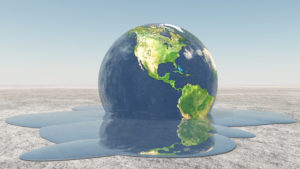
Bruce Rolff / Shutterstock.com
Earth Day is just around the corner and the environment is at the forefront of many minds. Many Americans, and people around the world, are upset at the choices being made by the current United States administration in regards to the safety of the environment and the acknowledgement of climate change. While the world as a whole should be working toward clean energy and a safer climate, the U.S. is taking steps backwards to dirty sources of fuel and denying that there is any scientific consensus about climate change at all. Throughout the world, and the U.S. as well, climate change and the environment remain important, and neglecting the science will have disastrous results.
This Earth Day, there is a planned March for Science that will be taking place in Washington D.C. and at 500+ other locations around the world. The website states the purpose of the march: “Science, scientists, and evidence-based policymaking are under attack. Budget cuts, censorship of researchers, disappearing datasets, and threats to dismantle government agencies harm us all, putting our health, food, air, water, climate, and jobs at risk. It is time for people who support science to take a public stand and be counted.” With any luck, the thousands of people who have already RSVPed will make their voices heard and make changes at the government level.
The following weekend, on April 29, is the People’s Climate March. The website states: “On the 100th Day of the Trump Administration, we will be in the streets of Washington D.C. to show the world and our leaders that we will resist attacks on our people, our communities and our planet. We will come together from across the United States to strengthen our movement. We will demonstrate our power and resistance at the gates of the White House. We will bring our solutions to the climate crisis, the problems that affect our communities and the threats to peace to our leaders in Congress to demand action.”
You may not be able to travel to your local march or want to get caught up in the crowds. If you care about the environment, though, or are disappointed with the lack of action at the national level, there are other ways to help. Many environmental charities fight the good fight every day, protecting lands from development, keeping sources of freshwater clean and pure, and researching sources of renewable energy. The rest of this blog will expand on top-rated environmental charities.
CharityWatch creates lists of nonprofit organizations and rates them according to their finances. The following top-rated charities “spend 75% or more of their budgets on programs, spend $25 or less to raise $100 in public support, do not hold excessive assets in reserve, have met CharityWatch's governance benchmarks, and receive ‘open-book’ status for disclosure of basic financial information and documents to CharityWatch.” In fact, the charities listed below are better than described. Those with A ratings spend 80% or more of their budgets on programs and $5 to $11 to raise $100 in public support. A+ rated charities spend 90% or more of their budgets on programs and less than $4 to raise $100 in public support.

paula french / Shutterstock.com
Charities with an A+ rating according to CharityWatch:
- Conservation Fund focuses on land and water conservation in areas that have significant historical or recreational value or provide habitats to a variety of wildlife.
- Environmental Defense Action Fund focuses on the political side of environmentalism by lobbying, making the voices of the people heard in Congress, and playing a part in legislation.
- Waterkeeper Alliance focuses on protecting sources of water around the world by advocating for clean energy and compliance with environmental protection laws.
Charities with an A rating according to CharityWatch:
- American Bird Conservancy focuses on saving and protecting the natural habitats of birds native to the Western hemisphere and fighting external threats to bird survival.
- Center for Biological Diversity focuses on conserving habitats, fighting climate change, and raising awareness about the sustainability of the human race to protect all endangered species from extinction.
- Conservation International Foundation focuses not on one issue or one location, but on conservation throughout the world, including forests, oceans, and soils, by working with governments, communities, and businesses.
- Earthjustice focuses on fighting on behalf of the environment, including for clean air, clean water, and clean energy, in the courtroom.
- Earthworks focuses on exposing the dangers of mining and energy production to encourage a switch to clean energy and environmentally safe practices.
- Keep America Beautiful focuses on individual communities throughout the U.S. by improving recycling success, ending littering, and hosting community beautification (clean-up, tree planting, etc.) events.
- National Park Trust focuses on preserving and protecting current lands owned by National Parks, acquiring additional land, and creating ways for children to interact with the parks, which will encourage them to become caretakers in the future.
- Sierra Club Foundation focuses on the environment, broadly defined, with the intention of creating an environmental grassroots movement, transitioning to clean energy, fighting against climate change, preserving public lands, and maintaining clean air and water.
- Trust for Public Land focuses on protecting and creating public lands and waters to be used as public parks, particularly in urban areas where parks and outdoor gyms are needed to strengthen the community.
- Wildlife Conservation Society focuses on identifying animal species and habitats in need of help throughout the world and working toward protecting them by partnering with communities, stopping wildlife trading, and fighting climate change.
- World Resources Institute focuses on fighting climate change and transitioning to renewable energy, fighting deforestation, preserving and providing access to clean water, and advocating for sustainable development.

stockphoto-graf/ Shutterstock.com
If none of these charities is exactly what you’re looking for, consider checking out Charity Navigator. This list contains all four-star (their highest rating) environmental charities; some function at the local level, but others work internationally to protect the environment and further conservation efforts. A selection of charities included on this list are:
- 350.org focuses on fighting against fossil fuel use, promoting clean energy, and working to force governments into reducing carbon emissions to limit climate change.
- Coral Reef Alliance focuses on preserving coral reefs and limiting the damage caused by tourism and fishing.
- National Audubon Society focuses on preserving habitats that are important to birds within the U.S. and putting effort into the recovery of bird populations that are declining.
- Natural Resources Defense Council focuses on the global environment to ensure that all people have access to clean air and water, a healthy natural environment, and sustainable food.
- Ocean Conservancy focuses broadly on protecting the world’s oceans by reducing the amount of trash in the oceans, promoting sustainable fishing practices, preserving the Arctic Ocean and wildlife, and reducing the land-based pollution that leads to ocean acidification.
Regardless of whether you can give or how much you can give, even just being informed about the issues that the world faces is helpful. Spread the message this Earth Day; the planet is for all of us.
-
Cheap Valentine’s Gift and Date Ideas Your Partner Will Love
-
Everything You Need to Know about Voting in the Upcoming Election
-
Happy Mother’s Day: Scholarships for Moms
-
Holiday Movies to Watch while You’re on Winter Break
-
Fun On-Campus Valentine’s Day Ideas for Singles
-
How to Conserve Energy in Your Dorm Room
-
April Fools’ Day Videos: Pranks That Made It into the Hall of Fame
-
Easy Ways to Contribute to Thanksgiving or Friendsgiving
-
The Biggest Fourth of July Celebrations in America
-
Remembering Martin Luther King Jr.
-
Surviving Black Friday and Cyber Monday
-
Celebrating Veterans Day

